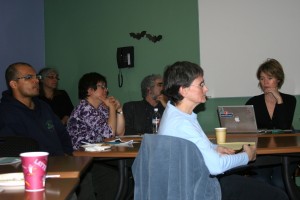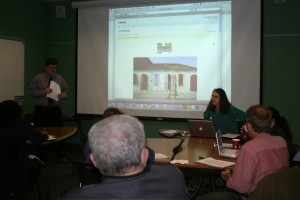If there is one thing more enjoyable than learning new ways to utilize technology, it is learning about new technology while eating delicious pie.
Yes. Pie. Three types. But we’ll get back to that.
The Wiki (made popular by the ubiquitous Wikipedia) was the topic for the first Emerging Technology and Pie workshop of the semester. Although many consider Wikis to be an ominous, daunting technology, Wikis have made huge strides in the ease of use since their inception in 1994 with WikiWikiWeb. Rather than learning an entire system of commands, there are numerous sites now that offer a simple WYSIWYG (what you see is what you get) editor that anyone with a browser and basic computer skills can navigate. Wikis have become infinitely more accessible to the everyday user – as one of the speakers remarked, “If I can do it, anyone can.”

Over a dozen instructors and faculty members eagerly attended the first Emerging Technology and Pie event of the semester on Monday, November 16th, to enjoy excellent examples and advice gleaned from the successful integration of Wiki technology into course cirriculum.
Two professors, Millicent Thayer of the Sociology Department and Kenneth Kitchell of the Classics Department, offered up examples from their undergraduate classrooms.

Professor Thayer and Professor Kitchell both utilize an online service called PBWorks. Thayer’s class utilizes Wikis in small groups to collaborate on topical information repositories. In her class on Latin America, there was simply too much material to cover in one semester. Rather than depriving the students of information for each of the countries due to lack of time, each student group became responsible for a country wiki page. Students had various responsibilities in authoring, editing, image production, and posting for each of the Country wiki pages. Through these efforts, Thayer’s class shared their group projects with other groups in the class, effectively creating their own class material.
Professor Kitchell’s class needed extraordinary amounts of help due to the difficulty of the material. Due to the split population (undergraduate students finishing out language requirements in the same class as graduate students), and the jump in material difficulty (as Kitchell explained, “we only have Dickens in Latin”) from basic Latin to classic ancient latin texts, there was a need for voluminous annotations so that students can translate the material. Rather than Kitchell helping each individual student out in numerous ways to complete their studies, he simply posted the Latin texts on his wiki and hyperlinked the more difficult words to other wiki pages. Each student was responsible for a portion of the text for annotating, and when stumped could request more experienced students for help. Professor Kitchell moderated the wiki, but admitted that there was little to do after the brief initial setup as his students worked collaboratively to annotate the ancient texts.
Wikis have obviously been adapted into helpful tools in the classroom. Both utilizations of wiki technology not only encourage students to collaborate on learning, thus increasing their retention of material, but also take a significant workload off the shoulders of the professor – turning the responsibility of learning to the students.
Oh yes, dessert. The Black Sheep Deli delivered some excellent examples of classic pies – Apple, Pumpkin, and Pecan. They were an excellent addition along with a nice cup of tea or coffee while learning about Wikis in the classroom.